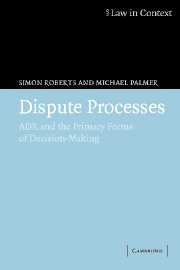Book contents
- Frontmatter
- Contents
- Preface
- Acknowledgements
- 1 Introduction
- 2 Cultures of Decision-making: Precursors to the Emergence of ADR
- 3 The Debates Around Civil Justice and the Movement Towards Procedural Innovation
- 4 Disputes and Dispute Processes
- 5 Negotiations
- 6 Mediation
- 7 Umpiring
- 8 Hybrid Forms and Processual Experimentation
- 9 The Trajectory of Alternative Dispute Resolution
- Bibliography
- Index
5 - Negotiations
Published online by Cambridge University Press: 05 June 2012
- Frontmatter
- Contents
- Preface
- Acknowledgements
- 1 Introduction
- 2 Cultures of Decision-making: Precursors to the Emergence of ADR
- 3 The Debates Around Civil Justice and the Movement Towards Procedural Innovation
- 4 Disputes and Dispute Processes
- 5 Negotiations
- 6 Mediation
- 7 Umpiring
- 8 Hybrid Forms and Processual Experimentation
- 9 The Trajectory of Alternative Dispute Resolution
- Bibliography
- Index
Summary
The Nature of Negotiation
Negotiation represents the primary, universal route to decision and action in the social world. The core features of negotiation are to be found in widely different contexts, ranging from the unselfconscious routines of everyday life to the formalised, set-piece exchanges of an international conference. These fundamental features remain constant whether the issue is uncontentious or a focus of extreme conflict. Thus, negotiation as a mode of decision-making spans everyday interaction and the more complex, stressful exchanges encountered in the context of disagreement and dispute.
The features of negotiation are revealed most clearly in simple, bilateral exchanges in which information flows in both directions, understanding is achieved and an outcome is reached – the lived counterpart of Habermas' theoretical construct, the ‘ideal speech situation’ (Habermas, 1979). So negotiation involves communication, leading to joint decision-making. It is a process over which the parties retain control; exchanges take place within a common universe of meaning; and these determine the outcome in immediate terms. Here the ultimate contrast is with acquiescence in an adjudicatory process in which power over the outcome lies with a third party (Extract 5:1).
A number of identifiable conditions have to be present if negotiation is to take place. The first involves finding some medium of communication that will allow messages to pass backwards and forwards between the parties; this may, but need not, involve finding a mutually acceptable forum.
- Type
- Chapter
- Information
- Dispute ProcessesADR and the Primary Forms of Decision-Making, pp. 113 - 152Publisher: Cambridge University PressPrint publication year: 2005

